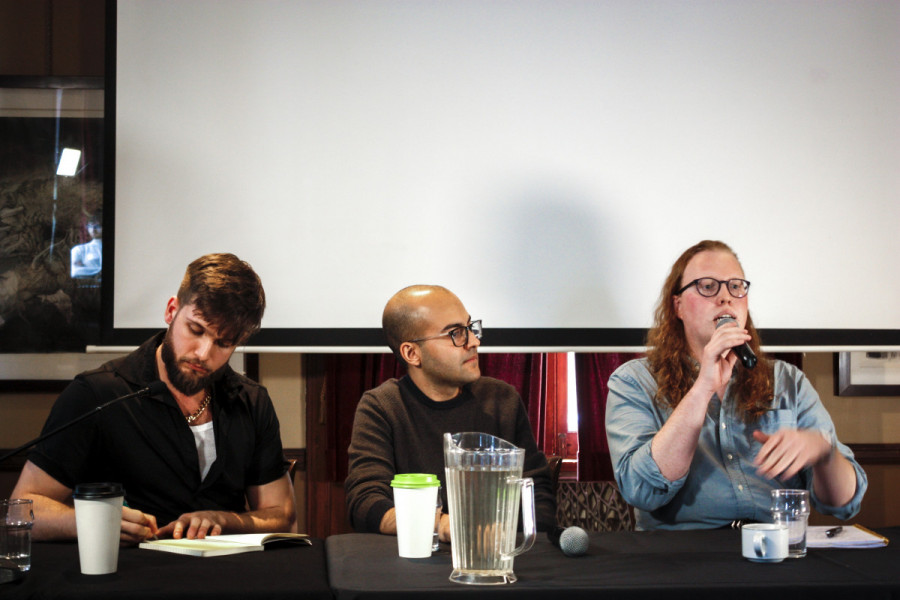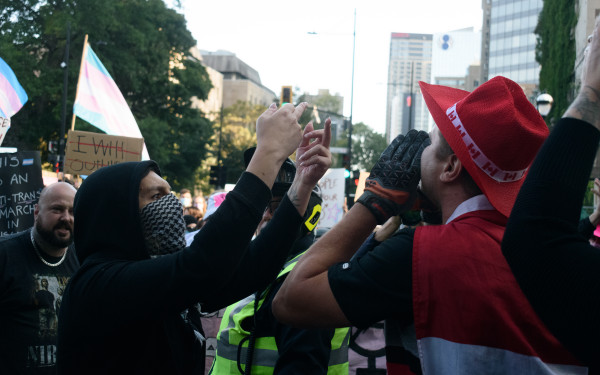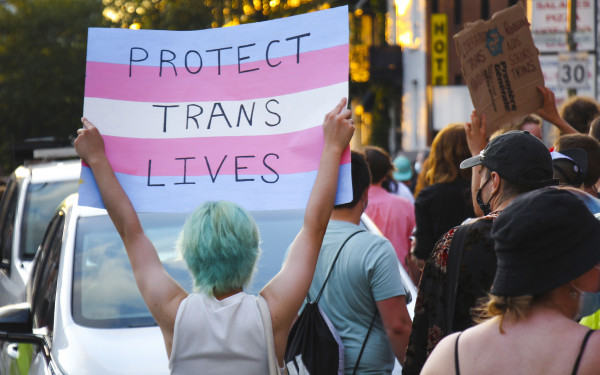Advocates Dissect Canada’s LGBTQIA2S+ Action Plan
“Power, Policy, and Queerness” Panel Sparks Discourse on Canada’s LGBTQIA2S+ Policies
On Jan. 10, the McGill Faculty of Law’s Centre for Human Rights and Legal Pluralism went ahead with a debate titled, “The Sex vs. Gender (Identity) Debate In the United Kingdom and the Divorce of LGB from T.”
The event featured Rob Wintemute, a law alum at McGill, and professor of human rights law at King’s College in the UK. The event was cancelled midway once a group of trans advocate protesters entered the debate, throwing baking flour at Wintemute and unplugging his projector.
This event caused pushback from McGill’s trans community and allies, as Wintemute is a trustee of the LGB Alliance, a group associated with being pro-conversion therapy and was described by protesters as transphobic.
Eight days after protesters shut down the debate, an antithetical event took place.
Dominique Garreaud, alongside other members of the Public Policy Association of Graduate Students, hosted a crowd of over two dozen on the top floor of the Thomson House at McGill University to attend a panel on Canada's policies and how they intersect with the LGBTQIA2S+ community.
The crowd comprised much of the Max Bell School of Public Policy's cohort, as well as others interested in public policy affecting Canada's queer population.
The panel served as a dissection of the Canadian federal government’s first action plan to "advancing rights and equality for Two-Spirit, lesbian, gay, bisexual, transgender, queer, intersex, and additional sexually and gender diverse people in Canada," released on Aug. 28, 2022.
When the panellists were asked about their thoughts on the new policy, they provided their critique.
Among the three speakers was Christopher Karas, a paralegal and federal litigant in the case of Karas VS Canadian Blood Services and Health Canada.
Another was Curt Wackett, program and policy research officer at Rainbow Railroad, an organization which helps LGBTQIA2S+ refugees worldwide and provides them with assistance. Lastly, Jaime Sadgrove, manager of communications and advocacy at the Canadian Centre for Gender and Sexual Diversity, was in attendance.
During 2020-21, Rainbow Railroad reached out to provide input proceeding the plan; they devised a detailed four-part plan."We wrote an entire list of incredible, really thoughtful, considerate recommendations for the government to include," Wackett explained.
The government, however, did not use Rainbow Railroad’s suggestions. Wackett described the government implementing "nothing relating to refugees," which was perceived by the organization as “a slap in the face.”
"When you are consulted, you are asked to bring your voices to the table, and you're supposed to have those voices included," said Wackett.
Karas also brought up his experience about negotiating with the government about policy changes, in his case, with his lawsuit against Canadian Blood Services.
"Trying to do that [lobbying and advocacy] work can be challenging when [the government is] trying to implement these policies which we didn't ask for," said Karas.
Karas also mentioned the government's lack of responsibility when he tried to contact them about policy reform. He received a letter from the prime minister's office acknowledging his outcry for change in Canadian Blood Services' policy. The office has yet to respond further to his inquiry.
"It's frustrating when you are trying to work on policy issues, and those that you're dealing with are not being responsive to that, so you have to find ways to make them responsive or to persuade them," Karas added that his method of making the government responsive was the lawsuit he filed. Even then, he said it can be tricky.
"We do very different work, the three of us. We work in different areas of policy making and have different backgrounds," said Sadgrove. They highlighted how their various experiences bring out the similarities in their work.
The panel was in place by PPAGS in pursuit of speaking to future public policymakers about the different policy issues faced by the LGBTQIA2S+ community in Canada.
Garreaud was the lead organizer of the panel, and a public policy student at the Maxwell School of Public Policy.
"While we were thinking about what we should organize, queerness as a topic came up and how important it is in policy making, and we decided to go with it. It's a very important topic; a lot of the cohort identifies as a part of the community, so it also speaks to them," said Garreaud.
"I'm queer, and I'm interested in a lot of policy issues regarding different groups […] it is going to be really interesting hearing from people who directly work on policy that is relating to queer communities, and it's really special to have a panellist with three people who all identify as queer. I don't think it is a very common thing," highlighted Hayley Krieger, a member of PPAG.
"It's nice to have this kind of discussion in a public space. This issue we don't see a lot in mainstream news," said Alison Clement, an attendee at the panel.
This article originally appeared in Volume 43, Issue 10, published January 24, 2023.



_600_375_90_s_c1.jpg)

_600_375_s_c1.png)
